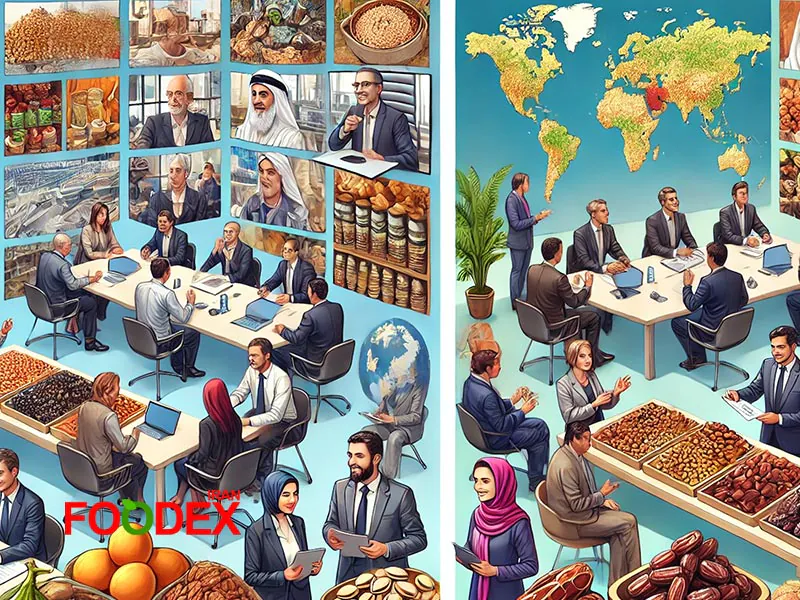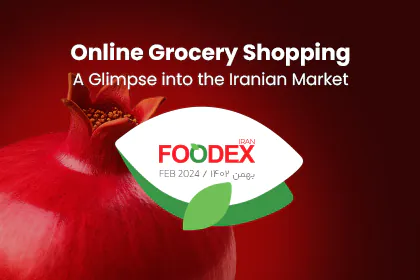Food exports are a great opportunity for Iran to expand its businesses and be present in world markets. Premium Iranian products such as saffron, dates, pistachios, and dried fruits are in demand worldwide. However, the success of food exports does not depend solely on producing great products. Strong and effective international collaboration is crucial for the success of this process.
Why International Collaboration Matters to Food Exports
Expanding international collaboration in food exports is very topical for Iranian companies due to the following reasons:
Entry into New Markets: Partnering with international distributors opens new avenues of markets in different parts of the world for Iranian companies.
Raise Competitiveness: Partnerships with international players have helped Iranian companies stay competitive at the global level.
Control Risks: Partnership with good suppliers and distributors lowers the logistic and financial risks of exports.
Common Problems Faced in International Collaboration
Even though international partnerships offer great potential, Iranian companies must overcome a few obstacles:
Cultural Differences: Business culture and negotiation styles vary from country to country. Understanding and adapting to these differences is important for successful partnership development.
Different Regulations: Each country has specific food safety, quality requirements, and import regulations. Companies must comply with these.
Trust Building: Building trust between international business partners takes time, and transparency and consistent communication are key to that.
Section 1: Finding and Selecting International Partners
Searching for and Identifying Importers and Distributors
The first phase of international collaboration is finding a partner you can trust. Businesses can use digital tools, trade platforms, and networks to find the right connections.
Strategy
B2B Platforms: International sites like Alibaba, TradeIndia, and other B2B platforms make it easier for Iranian companies to find credible distributors in their target countries.
Leverage Local Networks: Participation in trade fairs, conferences, and business meetings is crucial for identifying the right partners and exploring new business opportunities.
Example: An Iranian pistachio producer could use B2B platforms or attend food trade shows like Gulfood in Dubai to reach various distributors in the Gulf region and export their products to new markets.
Screening and Verifying Business Partners
Once potential business partners are found, they must be verified for credibility. This involves confirming their business history, financial strength, and whether they uphold trade agreements.
Strategies
Partner Verification: Preparing financial reports, contacting international credit assessment companies, and/or inquiring from legal authorities.
Customer References: Contacting previous customers or business partners to confirm the new partner’s trustworthiness.
Example: A date exporter might hire local consulting firms to verify the credibility and reputation of distributors in Central Asia to ensure they fulfill trade obligations.
Chapter 2: How to Develop International Partnerships
Trade Negotiation and Agreement
Trade negotiation and agreement play a vital role in developing international partnerships. Iranians should be familiar with the business culture of the country they are trading with and use the right negotiation strategies.
How to proceed
Clear Contracts: All shipping, payment, and delivery schedules should be clearly stated.
Setting Expectations: To avoid misunderstandings, financial and quality expectations should be communicated during negotiations.
Example: Iranian companies exporting to the Gulf should know local negotiation styles and draft contracts according to regional trade laws to ensure smooth transactions.
Building Strategic Partnerships
Strategic partnerships with international companies allow businesses to enter new markets while reducing export costs and risks. Such partnerships could include food production, packaging, or distribution.
Example: A strategic partnership between an Iranian honey producer and a reputable brand in Turkey could involve the Turkish partner handling packaging and distribution, reducing the Iranian business’s logistical costs.
Section 3: Enhancing Competitiveness for International Partnerships
Quality Improvement and Meeting Global Standards
Businesses must meet global quality standards to secure international partners. Obtaining certifications and adhering to environmental and safety regulations are essential.
Strategies
Acquisition of International Certification: Certifications like ISO and HACCP ensure health standards are met globally.
Ensuring Consistent Quality: Maintaining quality throughout production and distribution is crucial to gaining the confidence of international partners.
Example: Iranian date producers who aimed to export to European markets acquired ISO and HACCP certifications, which helped them win over buyers in highly regulated markets.
Leveraging Technology to Improve Communication and Supply Chain Management
Technology plays a crucial role in improving international partnerships and managing supply chains. Tracking systems and supply chain management software increase transparency and reduce costs.
Strategies
GPS Tracking Systems: These systems help businesses monitor shipments and address potential issues en route.
Supply Chain Management Software: Tools like SAP and Oracle help businesses efficiently manage inventory and reduce logistical costs.
Section 4: The Role of International Trade Shows and Events
Importance of Attending International Trade Shows
International trade shows provide an excellent opportunity for Iranian food businesses to showcase their products and build new partnerships.
Example: Iranian companies attending major international events like Gulfood and Anuga have successfully connected with new buyers and expanded into new markets.
Virtual Events for Network Building
In the post-pandemic world, virtual events and online trade shows have become practical ways to expand international collaborations without a physical presence.
Strategies
Virtual Trade Fairs: Iranian companies can attend virtual trade fairs and international webinars to seek better business opportunities without leaving the country.
Section 5: Understanding Challenges in Going International
Dispute Settlement and Legal Functions
No international partnership is free from disputes. Arbitration can be used to resolve conflicts and avoid escalation.
Strategies
Arbitration Clauses in Contracts: Contracts should include arbitration clauses for quick and cost-effective dispute resolution.
Example: An Iranian export deal with a European partner included an arbitration clause, helping resolve a financial dispute quickly and outside the courts.
Overcoming Cultural Issues in International Partnerships
Cultural differences can pose challenges in international business. Learning the business culture of partners can improve communication and strengthen relationships.
Strategies
Learning the Business Culture of Partners: Understanding negotiation styles and practices in target countries reduces misunderstandings.
Example: Iranian companies adapting to cultural nuances in Southeast Asia, such as respecting hierarchy and patience, saw greater success in building partnerships.
Conclusion and Recommendations
To succeed in food exports and expand international collaborations, Iranian companies must thoroughly research potential partners, form strategic alliances, leverage technology, and participate in trade events. Managing cultural and legal challenges is also key to sustaining long-term partnerships.
Key Takeaways
Conduct thorough research and verification of business partners.
Establish clear, well-defined contracts with arbitration clauses.
Meet global quality standards to gain credibility.
Actively participate in both physical and virtual international trade events.
Ehsan Allahverdi
Executive Manager of Foodex Iran
Marketing Consultant for Leading Food & Beverage Brands
website | linkedin




















